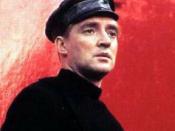As readers and writers we all may be reflected or even contrasted to one or many characters from any novel. This character could have gone through the quandaries we are facing right now, or ones that we have faced. Every character has a challenge or enigma to face, as we do too. In Fahrenheit 451, by Ray Bradbury, I reflect upon the character Montag the most. As many people say the eyes are a window to the soul, and what I interpreted through MontagÃÂs eyes was uncannily similar to that of my own.
To start, Guy Montag was the central character in Ray Bradbury's Fahrenheit 451. He made his living as a fireman in a futuristic American city, but not as a fireman who put fires out. Instead, he was the one who started them, but only to burn books. In his society, it was illegal to read books and the people who did read were prosecuted and jailed.
In the beginning of the novel, Montag met a girl named Clarisse McClellan. She was his new neighbor and met him randomly when he was coming home from work. Although she only talked to him for 3 minutes and were extreme opposites, she had reflected upon him greatly. For the same reason, in a quote Montag said:ÃÂImpossible; for how many people did you know who refracted your own light to you? People were often ÃÂ[ÃÂ ]ÃÂ torches, blazing away until they whiffed out. How rarely did other peopleÃÂs faces take of you and throw back to you your own expression, your own innermost trembling thought?ÃÂ (page 11)This similar event occurred to me as I read about Montag and how he talked with other people. For example, when he was talking with Clarisse, they were talking about what firemen did in the past: ÃÂIs it true that long ago firemen put fires out instead of going to start them? No. Houses have always been fireproof, take my word for it. Strange. I heard once long ago houses burned by accident and they needed firemen to stop the flamesÃÂ (page 8). In this quote, Montag showed that whatever he said was right and made the other person think it was right. This is what I did when I talked in a conversation with other people. I objected to their opinion and tried to make them think my opinion was actually a fact as Montag had done with Clarisse.
For other reasons, I felt deep empathy for Montag because his actions were being controlled by his boss. If he did not do something his boss said his job and even life would have been in jeopardy. For example, his job was burning books, if he did not burn a book, there would have been a conundrum, and there would be a conspiracy of him trying to revolt against burning books. This also would have led to the workers and his boss to think that he reads books at home. So, basically his job was throwing his life into the hands of someone else. I felt this empathy for Montag because I put myself in other peopleÃÂs shoes and saw how life was on the other side.
On the other hand, Montag and I also shared few contrasts. For example, one contrast between Montag and I was determination or revenge so powerful that it had led him to kill. In one part of the story, Montag was so fed up with Beatty that it led him to burn Beatty alive. Beatty said:ÃÂWell, thatÃÂs one way to get an audience. Hold a gun on a man and force him to listen to your speech. Speech away. ÃÂ[ÃÂ ]ÃÂ Go ahead now, you second-hand litterateur, pull the trigger. ÃÂ[ÃÂ ]ÃÂ Montag only said, We never burned rightÃÂ Hand it over, Guy, said Beatty with a fixed smile. And then he was a shrieking blaze ÃÂ[ÃÂ ]ÃÂ as Montag shot one continuous pulse of liquid fire on himÃÂ (page 119).
Montag killed Beatty knowing that now he was a fugitive. This was one contrast which showed MontagÃÂs difference from me. I would have never kept revenge powerful enough to murder someone as Montag had done.
However, this contrast that Montag had with me did bring out a good similarity between us. We both had determination, although his determination was more powerful than mine. In that quote, he was determined to get rid of his problem which he did, but that led him to becoming a fugitive. I have determination, but only enough to get me through tough problems or situations. For example, Montag showed his determination of getting rid of the whole firemen structure that was still standing. In a quote, he talked to an English Professor and the Professor had a plan that was supposed to be a joke, but Montag said it would have been a good idea:ÃÂNow, if you suggest that we print extra books and arrange to have them hidden in firemenÃÂs houses all over the country, so that suspicion would be sown among these arsonists, bravo I would say! Plant the books, turn in an alarm, and see the firemenÃÂs houses burn, is that what you mean? Faber raised his brows and looked at Montag as if he were seeing a new man. I was joking. If you thought it would be a plan worth trying, I would have to take your word it would helpÃÂ (page 86).
In this quote, Montag showed that, at this point, he did not really care about what he had to do as long as his problem would have been solved. He was determined to undermine the firemen, go against them, and jail them all to get rid of the firemen structure that stood in his society.
In comparison, Montag and I did have many similar personality traits and characteristics. For example, Montag was very open and friendly to new people that he met. In the beginning of the novel, he met Clarisse outside walking alone and started a conversation with her. He was not an introvert but an extrovert which showed one of the personality traits I had. One quote showed that he was not shy at all:ÃÂHe almost thought he heard the motion of her hands as she walked, and the infinitely small sound now, the white stir of her face turning when she discovered she was a moment away from a man who stood in the middle of the pavement waiting. Of course, he said, youÃÂre our new neighbor, arenÃÂt you? And you must be---she raised her eyes from his professional symbols---the fireman. ÃÂ[ÃÂ ]ÃÂ IÃÂd---IÃÂd have known it with my eyes shut, she said, slowly. What---the smell of kerosene? My wife always complains, he laughed. You never wash it off completelyÃÂ (page 5-6).
This quote showed that he was friendly to strangers that he met. He was not shy at all and started conversations with them not being rude or obnoxious. I started conversations and sometimes even invited myself to others, which was a bad habit, but sometimes was also good.
Hypothetically, the one prominent thing that I saw in MontagÃÂs future that I saw in mine was being able to change the person I once was. For example, Montag was a book burner, until he met Clarisse who posed the question ÃÂwhy?ÃÂ to him. This question made Montag wonder for what reason was he burning books. Was it because he was told to do it? Or was it the right reason and better for the people? I saw this question being posed to myself and making me realize what kind of person I was, and what kind of person I was going to become.
On the same topic, Montag was also a very thoughtful and considerate person. This character trait was something that we also had in common. For example, when Montag had the bullet-like device in his ear when he was apprehended by Beatty, Beatty had taken the device from Montag and said he would get it traced and drop in on his friend. This was another reason that led Montag to commit murder and kill Beatty. Montag did not want his friend to be involved because it was all his idea to go along with the plan. I would have done the same if I was in a situation like his, and I have done similar things like this. I would not exploit someone who was a part of my actions for I was the one who was caught. In one quote Montag showed how thoughtful he was:ÃÂMontag, get out of there! said Faber. Montag listened. Beatty struck him a blow on the head that sent him reeling back. The green bullet ÃÂ[ÃÂ ]ÃÂ fell to the sidewalk. Beatty snatched it up ÃÂ[ÃÂ ]ÃÂ held it half in, half out of his ear. Montag heard the distant voice calling, Montag you all right? Beatty switched the green bullet off ÃÂ[ÃÂ ]ÃÂ Well---so thereÃÂs more here than I thought. ÃÂ[ÃÂ ]ÃÂ WeÃÂll trace this and drop in on your friend. No! said MontagÃÂ (page 118-119).
This quote showed that Montag did not let down his friend. He would have sacrificed himself to stop Beatty from killing his accomplice. This was the kind of thoughtfulness I would have shown to my friends or accomplice if I was in his situation.
All in all, a character in a novel is just a character portrayed by what the author wants him/her to be. These characters could have many similarities to us varying from personality, physical features, or even the way we think. Many novels have these characters that have gone through the problems we faced and could connect to us in a way that we can only see. This just goes to show that, even though the character is not real, they still can be a part of you from the way they were portrayed in the novel.
BibliographyFahrenheit 451, by Ray Bradbury





